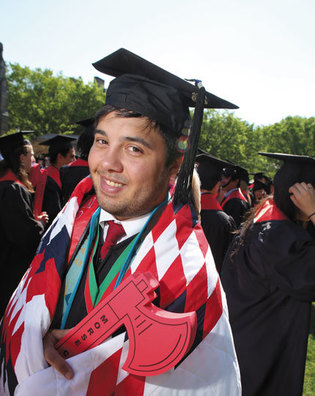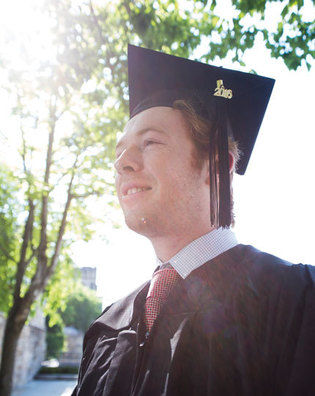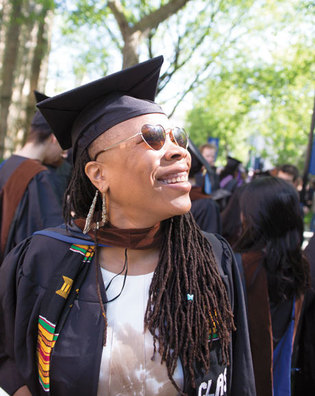
Mark Ostow
Thomas Tolton
Hayes, SD
Political Science, Morse College
Is your hometown rural?
Very rural. I went to a one-room schoolhouse for the first eight years. I live an hour from town on a cattle ranch. My high school [class] was a class of 39.
Tell me about this quilt.
I am a Cheyenne River Lakota Sioux. Tradition is that, upon a big moment in someone’s life, whether it be graduation, or retirement, or some other major accomplishment, the tribe and the elders—the community—bestow on you an honorary star quilt. It’s made by someone in the tribe. This blanket was my great-grandfather’s. He was one of the big reasons why I came to Yale. He was an elder in the tribe. He passed away last year. He was a major supporter of my education. No one had been to an Ivy League school that we know of from my high school or my area. He saw that as a true possibility.
Was there a particular class at Yale that you’ll remember?
Moral Foundations of Politics, with Ian Shapiro. It introduced me to a way of thinking and a style of academic engagement. I guess I discovered a passion.
What’s your next step?
I’m doing Teach for America back in rural South Dakota.

Mark Ostow
Sam Fenwick
Nantgarw, Wales
Political Science, Ezra Stiles College
Why did you choose Yale?
I was just pretty fortunate when I was getting recruited for squash. We had a few Celtic guys—a few from Ireland, a few from Wales. I really liked the team a lot. It was the university I applied to first.
How was your experience here different from what it would have been in Wales?
I would have gone to University of York. I can’t imagine a place that would provide me with a better educational experience than the one I’ve had at Yale. There’s also a cultural experience, coming to a different country. I always loved the thought of going to the United States. I just loved the positivity and the people. Coming here changed my mentality. [The culture] makes you want to do a bit more in life.
Do you know what that “more” will be for you?
For now, I’m looking to go into professional squash. Regardless of what I apply myself to, my thought process is, I feel, a lot wiser now. Whether it’s sport or whether I want to go into a career, Yale teaches you how to think.
How and where will you try to go professional?
I’ll base myself out of Philadelphia, then hopefully get a professional athlete’s visa. I’ll be coaching to finance myself traveling the world and playing professional tournaments.

Mark Ostow
Tomashi Jackson
Los Angeles, CA
Master of Fine Arts, School of Art
What is your medium?
My department is painting and printmaking.
Did you come to Yale straight from undergrad?
No. Before, I was a caregiver for children. I went to MIT for a Master of Science degree in architecture and planning. My undergraduate work was at the Cooper Union for the Advancement of Science and Art.
How did your perspective change while you were at Yale?
Oh, boy. I learned a lot about color, about form, about materiality. I was influenced at MIT to pursue research formally as a foundation for my practice. Here, the visualizing of research became crystallized.
Could you give an example?
I relied upon the school of law to research school desegregation in 1954, prompted by the very visual experience of contemporary resegregation. The amazing law school here allowed me to read texts and delve into the visual documentation of the NAACP’s case and to visualize that in my studio through painting, using primarily geometric color abstraction.
This program really brought everything together for me. I feel prepared to work in the world as a professional artist. It’s not just a dream anymore.
Courtney Pedersen
Bloomingdale, OH
Master of Public Health, School of Public Health
What did you do before coming to Yale?
I did two years of research, and then I worked for over three years in West Africa, in Senegal, with the Peace Corps. I stayed on an extra year to be the research coordinator at the national level. I worked with women on reproductive health and with adolescents on sexual health, promoting the use of family planning among women that were interested in spacing their births.
What’s the ideal spacing?
Three years.
Do you know where you’re going now?
To Stanford medical school. The plan was always to go to medical school, and then as a Peace Corps volunteer I realized the importance of public health. The path swerved a little bit, but it was always to be a physician.
Are you going into obstetrics?
Possibly infectious disease, or OBGYN. I would like to do clinical work but also research, specifically looking at how to increase access to health care for marginalized populations. Last summer, I worked with women who were incarcerated. Correctional medicine really interests me. We see a lot of recidivism and mental health and substance abuse issues. So changing the prison system from a punitive system into rehabilitation would serve all of us.
Carleen Liu
Alhambra, CA
Cognitive Science, Berkeley College
Has your academic path been what you’d expected?
Yes and no. I think a lot of people, even now as we’re graduating, still have this idea that it needs to be a straight path to somewhere, that everything needs to coalesce in order to get to a certain endpoint. I think it’s a lot more like a zigzag. I don’t necessarily think that everything has to build up to a certain point in my career, though I do feel like Yale cultivates that a lot. But it also opened many doors to things that I wouldn’t have tried, [like] creative writing and poetry, even though I’m a cognitive science major. Interests don’t necessarily have to mesh, and that’s okay. I’m 21 years old; I’m still young.
Do you have a job lined up?
I’m doing nonprofit consulting, which is not related to cog sci or creative writing. [My friends] were making fun of me: They were, like, “Consulting without the perks.” I think there are a lot of problems in the nonprofit world that aren’t easy to solve, so it will be good to see how people try to make it more effective, how they solve problems of funding and management structure. It’ll be different: college life is not normal at all. I’ll appreciate being able to pull into a grocery store parking lot and buy some milk. Just something really normal. I’m looking forward to that.
Joshua Fontaine
First cook, Berkeley College
Graduate of the Culinary Institute of America
When did you start preparing for this commencement lunch?
Two weeks ago.
What can you do ahead?
We do dress rehearsals, where we’ll do just a pan of each dish. We get everything locked down tight so there’s no guessing on the day of. Everything is timed to the minute, and we have pictures of how we’re going to present each dish. We try to figure out what’s a smart garnish—what really brings out the dish and makes it pop. Because we don’t want it to just be good food; we want it to be great food.
Are you doing anything new?
Our beef this year is all grass-fed, grass-finished Australian beef. It’s an amazing product.
From Australia?
Yeah, and believe it or not, it’s more sustainable than getting our beef from the United States. It takes less energy to raise a grass-fed cow than a grain-fed cow. Even with the shipping process, it’s still less of a carbon footprint.
The beef dish is an herb-and-mustard-encrusted beef sirloin served with a dark onion-mustard sauce. We take beef stock and reduce it down, and we caramelize these onions and then cook it all together, tighten it up, finish it with mustard. That I started yesterday, and it’s finally done now.
What are some commencement traditions?
We go and watch the procession. We all have our little Berkeley flags, and we get to cheer for our students as they’re walking by.
 loading
loading